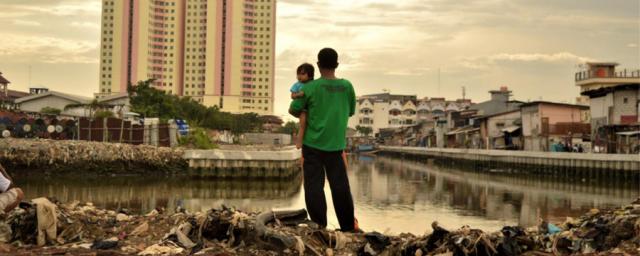
In the past two decades, the gap between the richest and the rest in Indonesia has grown faster than in any other country in South-East Asia. It is now the sixth country of greatest wealth inequality in the world. Today, the four richest men in Indonesia have more wealth than the combined total of the poorest 100 million people.
Growing inequality is undermining the fight against poverty, putting a brake on economic growth and threatening social cohesion.
What does this mean for ordinary people? The poorest citizens – particularly women – receive low wages and face insecurity at work. Access to infrastructures such as electricity or decent roads is unequal with rural areas less provided for than urban ones. The vast majority of the land is owned by big corporations and rich people who get all the benefits. Likewise, the education system is underfunded and there are barriers to equal access, which means many Indonesian workers cannot access higher-skilled and higher-paid jobs.
We met Siti and Darmin, who are fighting for a better future for them and their families.
Siti Maryam: catching up with dream

Siti Maryam (44 years old) is a domestic worker for a family in South Jakarta. Maryam is a widow and mother of two. Her husband died over five years ago.
She has been working as a domestic worker since she was 15 years old, two years after graduating from primary school. Maryam and her two older siblings had to drop out of school. Their farmer parents could not afford to keep them in school.
“My main focus was to send money home to help my parents,” she said.
Her lack of formal education has hindered her from entering formal employment, as the minimum requirement is high school certification.
Maryam still has the ambition to finish her secondary education. Right now she is attending the evening class to prepare for her junior secondary school certificate. She said, “I don’t want to miss this opportunity. It’s my dream to have high school certificates.”
Darmin: trapped in poverty
Darmin, a tofu maker and seller, moved to Jakarta more than 40 years ago. He has been moving around from one place to another carrying his asbestos shack with him. Today, he lives in the middle of the city, in a plot owned by a rich Indonesian.

Everyday he cycles around his neighborhood to sell his tofu and earns on average Rp 50,000/day (less than $4). His earning has not changed much over the years. He said, “Everything is much more expensive now. At least now all my children have grown up and I don’t have to look after them.”
Darmin only graduated from primary school in his hometown in Pekalongan, Central Java. He feels fortunate that all of his five children have had a high school education and most were able to find employment in offices, only one is still living with him and works in the informal sector.
Tackling inequality in Indonesia: a matter of political will
There’s a public desire for the government to take action to close the gap, and President Jokowi has made fighting inequality his administration’s top priority for 2017. Although some policy measures are already in place, the government could go further.
Read our report ‘Towards a more equal Indonesia’ and find out how the Indonesian government can take action to close the gap between the richest and the rest.